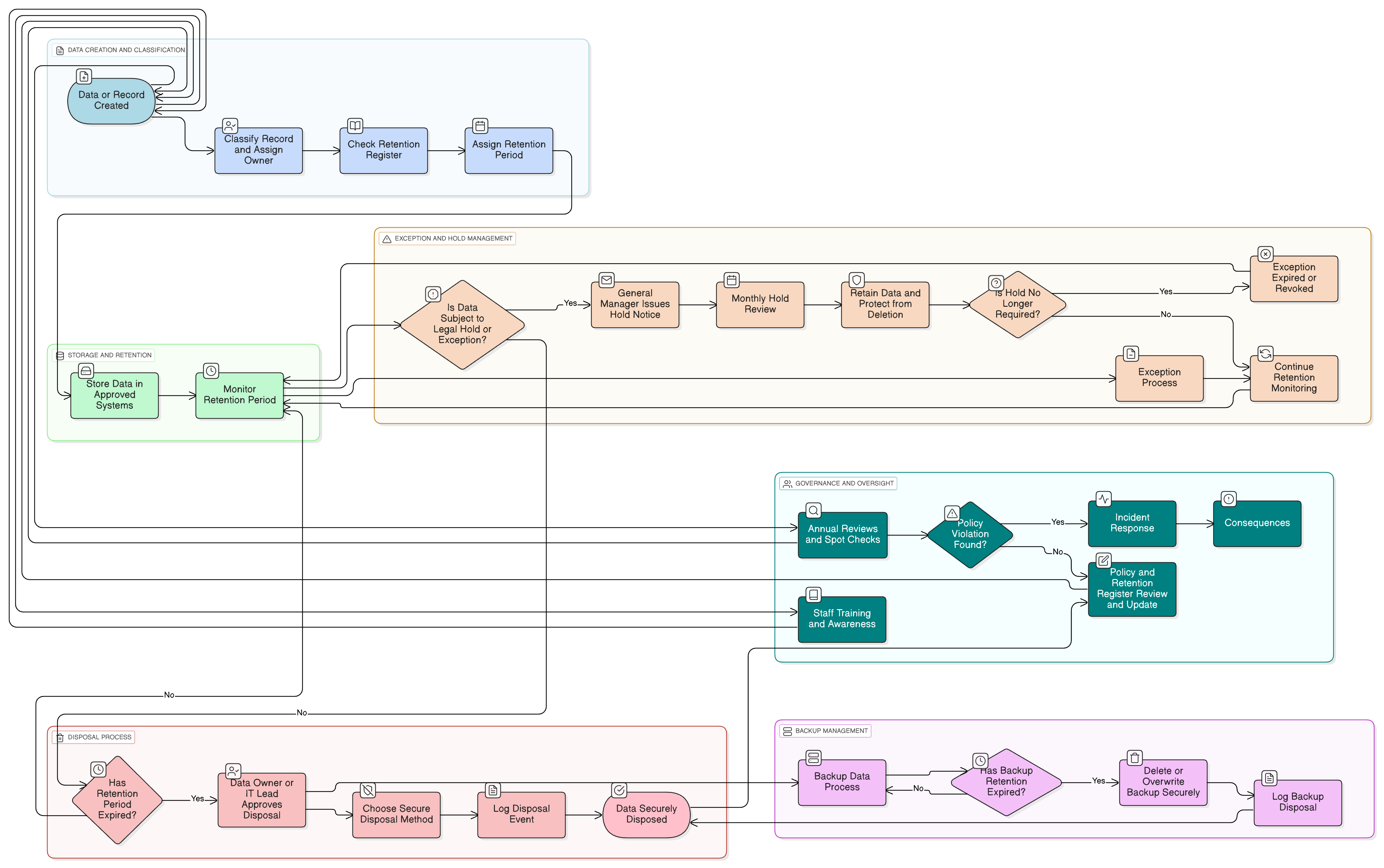Overview
This Data Retention and Disposal Policy for SMEs outlines rules for keeping and securely disposing of all business and personal data, assigning clear responsibilities and aligning processes with ISO/IEC 27001, GDPR, and related standards. It ensures compliance, helps manage legal risk, and supports efficient information governance in organizations without dedicated security teams.
Regulatory Compliance
Ensures data retention and disposal aligns with ISO 27001, GDPR, NIS2, and other major standards.
SME-Friendly Roles
Designed for SMEs, assigning responsibility without requiring specialist IT security teams.
Secure Lifecycle Management
Guides staff through secure retention, deletion, and disposal of all data formats and media.
Audit-Ready Framework
Supports annual reviews, thorough documentation, and audit-friendly retention controls.
Read Full Overview
Policy Diagram

Click diagram to view full size
What's Inside
Scope and Data Categories Covered
Retention Register Governance
Roles for General Manager, Data Owner, IT Lead
Secure Disposal Methodology
Backup Retention and Disposal
Risk, Exception, and Audit Mechanisms
Framework Compliance
🛡️ Supported Standards & Frameworks
This product is aligned with the following compliance frameworks, with detailed clause and control mappings.
| Framework | Covered Clauses / Controls |
|---|---|
| ISO/IEC 27001:2022 | |
| ISO/IEC 27002:2022 | |
| NIST SP 800-53 Rev.5 | |
| EU NIS2 | |
| EU DORA | |
| COBIT 2019 | |
| EU GDPR |
Article 5(1)(e)Article 17
|
Related Policies
Governance Roles And Responsibilities Policy-SME
Defines policy ownership and authority for exceptions.
Data Classification And Labeling Policy-SME
Determines how retention rules align with data classification.
Asset Management Policy-SME
Governs storage media containing data subject to retention/disposal.
Data Protection And Privacy Policy-SME
Ensures data minimization and supports lawful processing under GDPR.
Incident Response Policy-SME
Activated when disposal or retention failures result in potential data exposure.
About Clarysec Policies - Data Retention and Disposal Policy - SME
Generic security policies are often built for large corporations, leaving small businesses struggling to apply complex rules and undefined roles. This policy is different. Our SME policies are designed from the ground up for practical implementation in organizations without dedicated security teams. We assign responsibilities to the roles you actually have, like the General Manager and your IT Provider, not an army of specialists you don't. Every requirement is broken down into a uniquely numbered clause (e.g., 5.2.1, 5.2.2). This turns the policy into a clear, step-by-step checklist, making it easy to implement, audit, and customize without rewriting entire sections.
Retention Register Structure
Uses a structured register to document retention periods, legal basis, and disposal methods for each data category.
Enforced Legal Holds
Built-in process for legal holds to protect records from deletion during litigation, audits, or investigation.
Automated & Manual Enforcement
Supports retention and disposal with configurable automation plus manual checks for limited systems.
Frequently Asked Questions
Built for Leaders, By Leaders
This policy was authored by a security leader with 25+ years of experience deploying and auditing ISMS frameworks for global enterprises. It's designed not just to be a document, but a defensible framework that stands up to auditor scrutiny.
